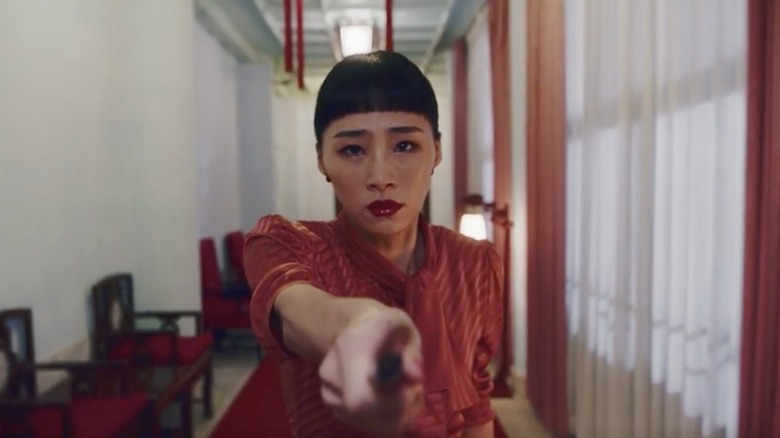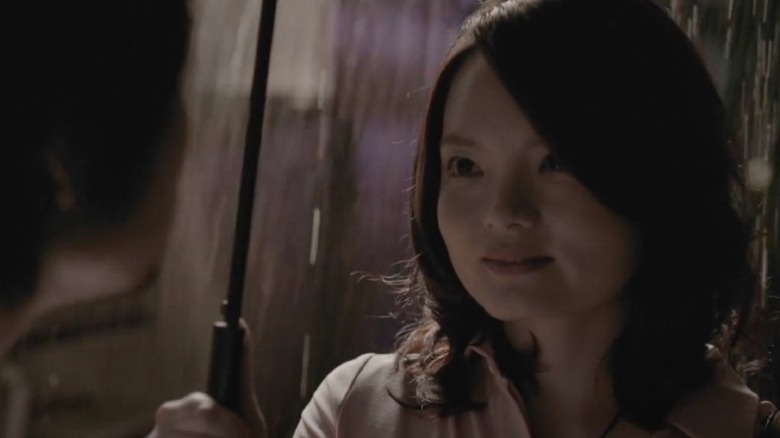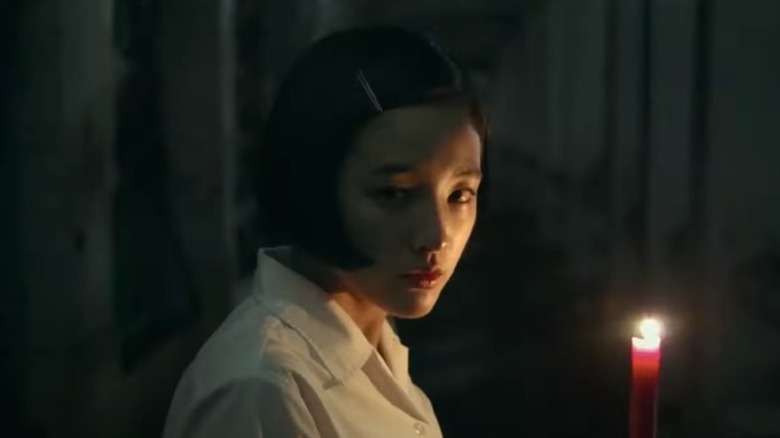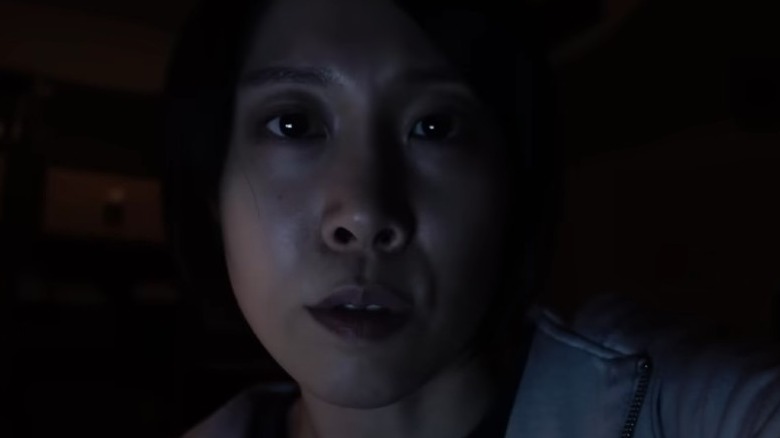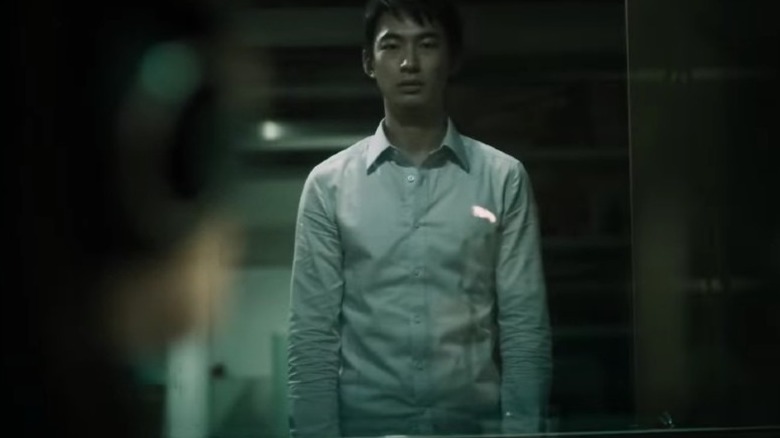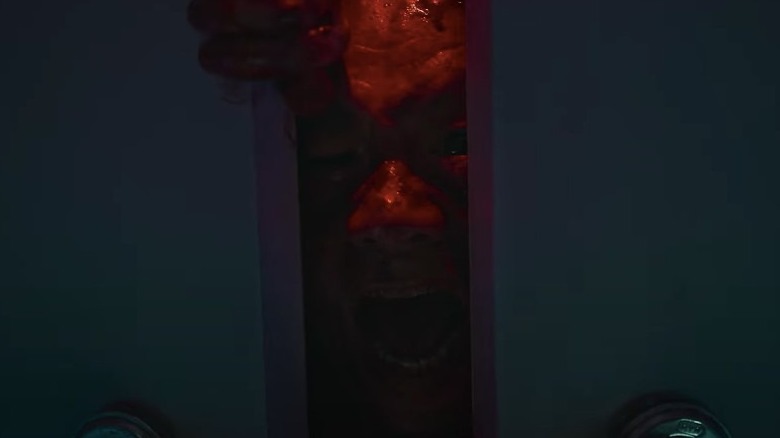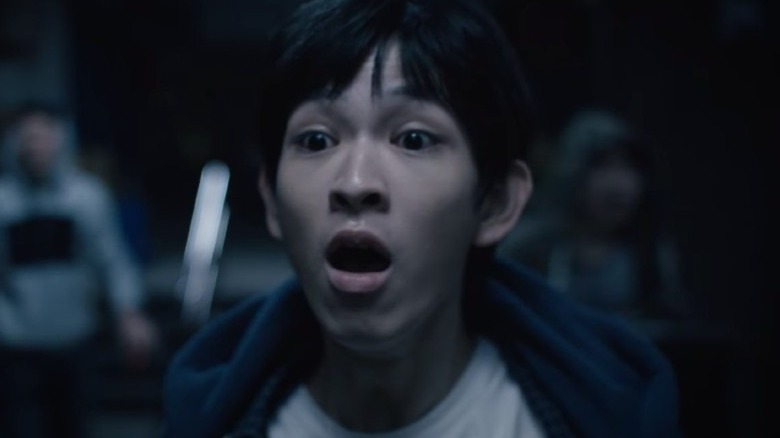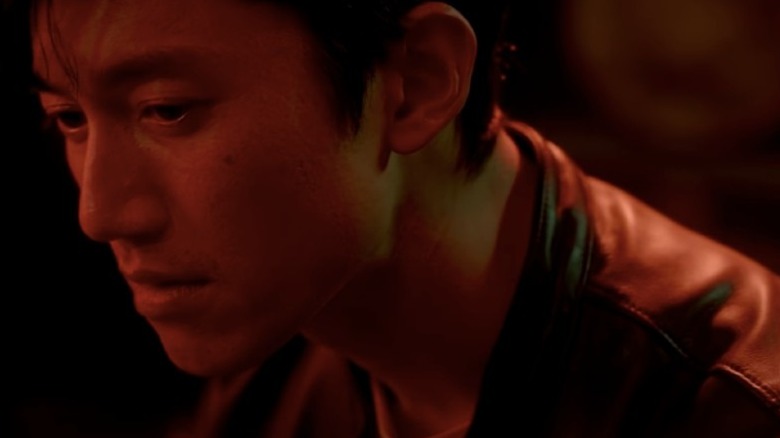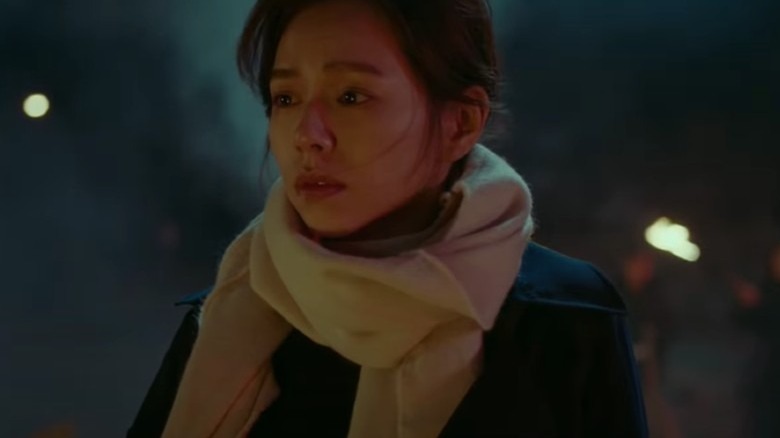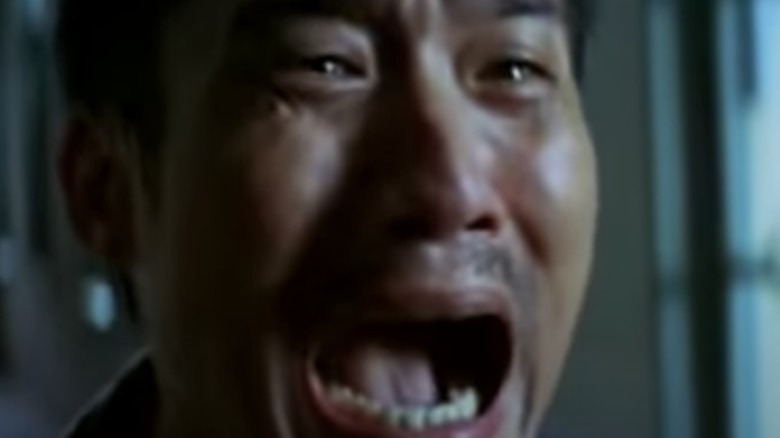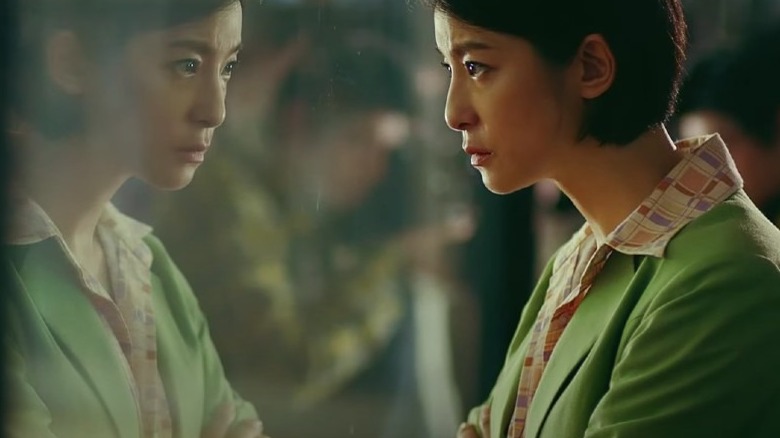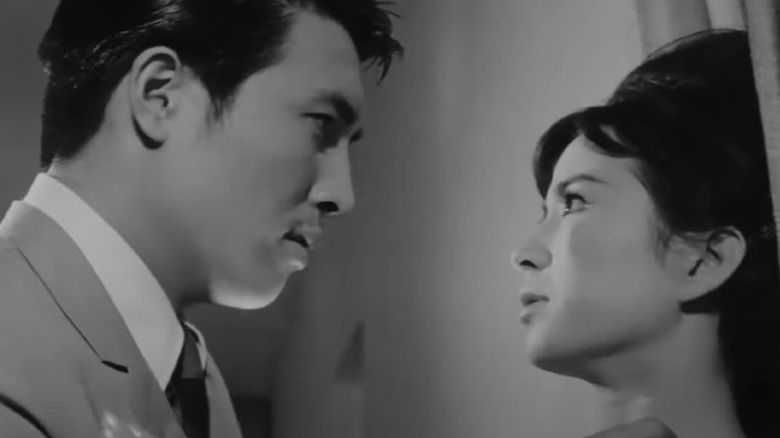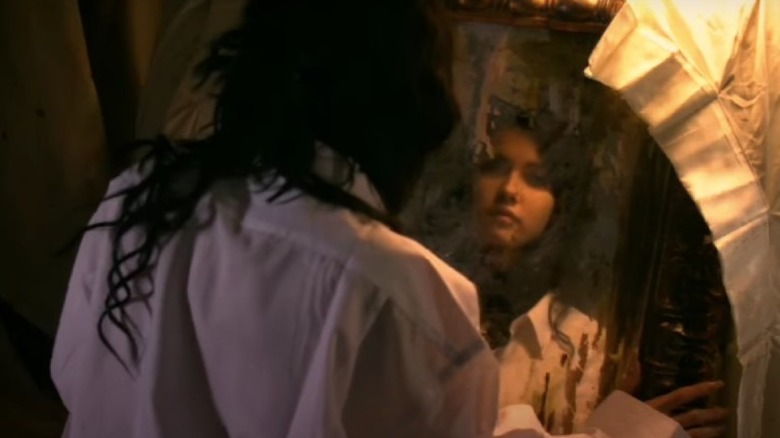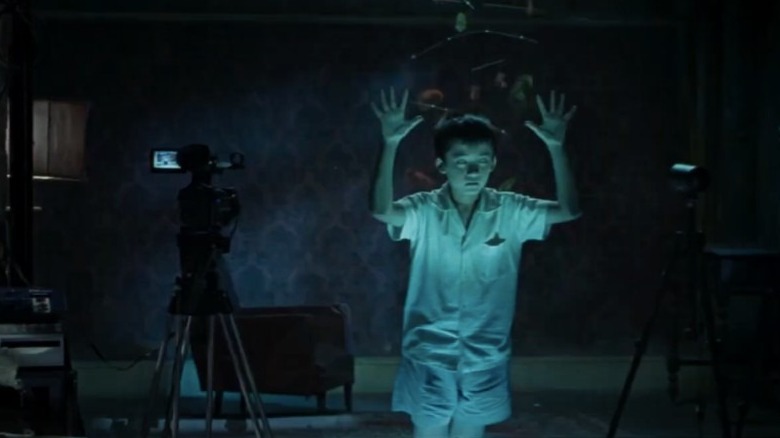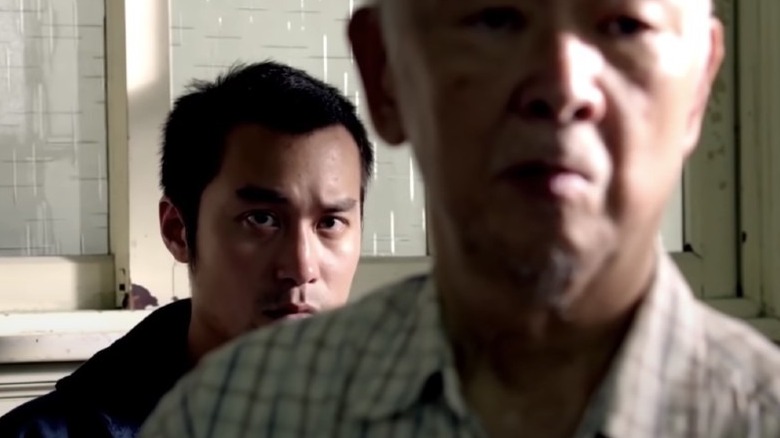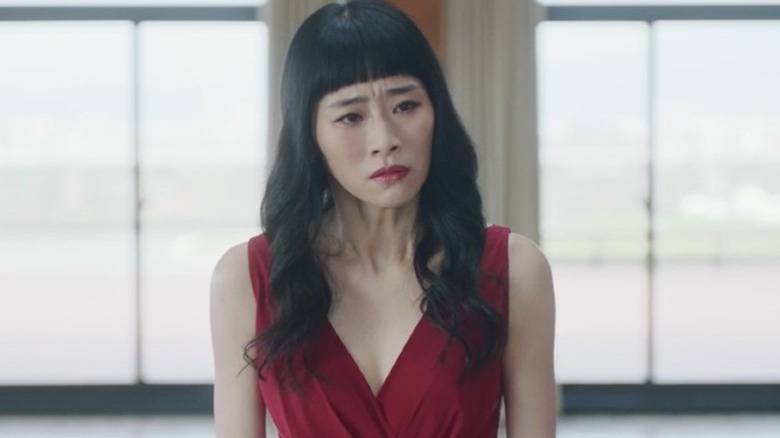15 Best Taiwanese Horror Movies Of All Time
In the last 20 years, Taiwan has become a pivotal voice in horror. A few Taiwanese horror films cropped up throughout the '60s, '70s, and '80s. But 2002's "Double Vision," one of the first Hollywood-funded productions in Taiwan cinema, completely changed the genre. In the following decades, Taiwanese horror planted its flag firmly in the modern landscape and declared itself a prominent leader in the future of horror. Whether they offer a fresh glimpse into familiar territory or venture into the dark recesses of the wildly unhinged, Taiwan's contributions to modern horror are nothing short of remarkable. It's quickly becoming a force, with many entries competing directly with J-horror and K-horror.
Our list showcases the country's finest entries, including films that twist the membrane and some that soak you in blood. As you'll notice, most of our selections were released during the 2010s when Taiwan began taking full advantage of a flourishing global horror audience. More than anything, the picks below will whet your appetite for the smorgasbord that is Taiwanese horror.
The Very Last Day (2018)
By design, rape-revenge films are hard to digest. A relentlessly-violent, graphic depiction of sexual assault is just one of the genre's hallmarks, which first cropped up in the '70s with critically-eviscerating films like "I Spit on Your Grave" and Wes Craven's "The Last House on the Left." With Cedric Jouarie's "The Very Last Day," the filmmaker retools conventions to tell a far more poetic story than the subgenre has previously seen.
In his latest book, popular novelist Raymond (Lawrence Ong) details how he once raped a girl 20 years ago. Raymond has made a name for himself by telling sensationalized stories from his life. But his new book "The Very Cold Summer" aims to paint him as innocent of his crimes. When an admirer takes him hostage, there appears to be much more to the story.
Jouarie utilizes stylized vignettes to piece together the past and the present in an elegant way. "The Very Last Day" is as underrated as they come, as it leans into expectation and lures the audience into a tangled web of mystery, rebellion, and heart-pounding retribution.
If you or anyone you know has been a victim of sexual assault, help is available. Visit the Rape, Abuse & Incest National Network website or contact RAINN's National Helpline at 1-800-656-HOPE (4673).
Detention (2019)
Few video-game-to-film adaptations work. John Hsu's "Detention" feels like an immersive video game experience and a film with legs of its own. Co-written by Hsu, Fu Kai-Ling, and Chien Shi-Keng, the 2019 film pulls from the 2017 video game of the same name. Fortunately, the film's spooky style and video game feel never get in the way of the powerful story set amidst the White Terror, the four decades-long oppression of Taiwanese civilians.
Hsu's directorial debut takes place in the 1960s, following a group of students desperately seeking knowledge. Helmed by their teacher, the students host a secret book club to analyze books banned by the government. Such a risk comes with heavy punishment — mostly physical torture and isolation. One student, Wei Chong Ting (Tseng Ching-Hua), is considered a traitor and is tortured for information. When he emerges from his entrapment, he discovers he has now entered a disturbing and wildly dark version of his high school.
This eye-popping world-bending signifies the students' psychological pain. Now, it's up to them to fight their way through a confusing labyrinth of visions and nightmares if they hope to survive. "Detention" grips your skin and peels it back, exposing pulsing veins beneath. Yes, it's that good.
If you or someone you know may be the victim of child abuse, please contact the Childhelp National Child Abuse Hotline at 1-800-4-A-Child (1-800-422-4453) or contact their live chat services.
Incantation (2022)
Kevin Ko's "Incantation" earns a space next to numerous other terrifying found footage horror gems like "Host" and "The Taking of Deborah Logan." Ko co-wrote the script with Che-Wei Chang, and they bring a galvanizing emotional urgency to what appears to be a typical found-footage story.
Told through Li Ronan's (Tsai Hsuan-Yen) perspective, the film opens with a hypnotic incantation to bestow goodwill upon her daughter. Li instructs the viewer to follow suit, memorizing a symbol and chant that'll come into play later in the film. She then unravels the mystery of a strange tunnel she found six years ago. Along with her boyfriend Dom (Sean Lin) and his close friend Yuan (Wen Ching-Yu), Li travels to the remote location and visits Yuan's relatives as they're practicing a Yunnan ritual. We learn they violated a religious taboo while filming their trip to the Chen clan village.
Whenever a found footage film involves religious sacraments or ceremonies, you can expect disrespect for another's culture and practices. "Incantation" is no different. Ronan soon discovers that her disregard for certain beliefs may have a deadly price. The film takes everything that works well in the genre and ratchets it up to 100. Running on nightmare fuel, "Incantation" is one of 2022's best films and a vital touchstone for future found footage entries.
The Tag-Along (2015)
Wei-Hao Cheng's "The Tag-Along" frames its story around a well-known urban legend about "The Little Girl in Red," a ghost who attaches to innocent victims and drives them mad. Whenever the little girl traps someone, they must wander in the nearby woods for all of eternity 一 unless they speak someone else's full name, thus dooming them next. If they do this, they are freed and can return to their home.
"The Tag-Along" tells the story of Wei (River Huang) and his grandmother Shu-fang (Liu Yin-Shang) during a particularly stressful period in their lives. Wei works in real estate and plans to marry his girlfriend Yi-Chun (Wei-Ning Hsu), who works late nights as a radio DJ. One by one, those close to them randomly disappear without a trace. Concerns deepen when Shu-fang and Wei cross into a little girl's sights. A group of locals starts a search party, but it's an almost futile effort.
A few shoddy CGI sequences aside, "The Tag-Along" contains genuine frights and delights. Body-jolting paranormal moments counterbalance more subtle, background scares, culminating in a gripping adventure. Like the little girl in red, the film worms its fingernails deep into your subconscious.
The Sadness (2022)
Writer-director Rob Jabbaz's "The Sadness" is not for the faint of heart but it's also one of the greatest films of all time. Visceral, mean, and gruesome, the 2021 film earns a place next to films like "Cannibal Holocaust" and "Blood-Sucking Freaks." While it lives within the realm of apocalyptic zombies, "The Sadness" pushes boundaries in such extreme ways that it rejuvenates the genre — even if it makes you physically ill.
"The Sadness" follows Kat (Regina Lei) and her boyfriend Jim (Berant Zhu) living their quiet lives. They wake up, snuggle, and head off to work. But almost instantly, something feels strangely off. When they witness a violent outburst, they dismiss the moment as nothing of great importance. But how wrong they are. Brutal acts of violence erupt throughout the country, as it's the early days of a zombie outbreak. Expect wall-to-wall blood, guts, and gore — as you'd imagine in any zombie outbreak film.
Where many zombie films give you moments to breathe, "The Sadness" suffocates. Mind-blowing setpieces follow one after another, including graphic depictions of sexual assault. Be wary, it's as extreme as might expect. Still, you'll have your expectations upended.
If you or anyone you know has been a victim of sexual assault, help is available. Visit the Rape, Abuse & Incest National Network website or contact RAINN's National Helpline at 1-800-656-HOPE (4673).
Mon Mon Mon Monsters! (2017)
Writer-director Giddens Ko takes an anvil to themes of bullying and accountability in 2017's "Mon Mon Mon Monsters!" Billed as a horror/comedy, the script relies primarily on exaggerated characterizations and situational humor. The film centers around Lin (Yu-Kai Teng), a shy and introverted teen trying to navigate schoolwork and bullying. Quickly, the audience meets a vat of terrible people. Every day is a living hell for Lin. Tuan (Kent Tsai) and his posse incessantly torment him. When asked why they won't leave him alone, they say they're doing it "for fun." As punishment, Lin is given community service, along with Tuan and the other bullies. Together, they do nothing but grossly abuse the elderly and the homeless. Lin gets in on the action, only as a way to deter them from bullying him further.
"Mon Mon Mon Monsters!" addresses how easily bullies mistreat others and get away with it. Eventually, the group discovers a human-creature hybrid — a young monster that lives on human flesh. Tuan convinces the others to tie up the creature and abuse it with sunlight, which is dangerous to its skin. The creature emits whimpers that'll just break your heart. The film excels in proposing timely moral questions about humanity's own monstrous state: the real monsters are and have always been humans.
If you or someone you know may be the victim of child abuse, please contact the Childhelp National Child Abuse Hotline at 1-800-4-A-Child (1-800-422-4453) or contact their live chat services.
The Bride (2015)
In "The Bride," director Lingo Hsieh, who co-wrote the script with Chun-Pin Tsai and Takashige Ichise, examines the Chinese tradition of ghost marriage through a rich narrative. Possessing a polished look, the film blends jump scares with quiet shapes shifting and dancing in the background. That alone is enough to keep you awake at night.
While on his morning run, supernatural television producer Liu Cheng-Hao (Wu Kang-Ren) comes across a red envelope tucked away in a tree. He doesn't think much of it and continues his day. Later that afternoon, his crew films a TV segment about ghost marriages and interviews a Taoist medium, who senses that Cheng-Hao may have unwittingly become emeshed in a secret ghost marriage. At home, he hops in the shower and notices fingernail marks on his chest. Meanwhile, his wife appears to have a neck injury. It's all mysterious and strange 一 until the finale when all the pieces snuggly fall into place.
In a separate storyline, a young high school student named Lin Yin-Yin (Vera Yen) is hallucinating nightmarish things. She's always had this power, yet her visions are growing more intense. The two stories seem to have nothing to do with one another until the two merge at an abandoned house in the woods. "The Bride" operates as a spooky ghost story, refreshingly using the unreliable narrator convention.
The Rope Curse (2018)
"The Rope Curse" requires a trigger warning for graphic depictions of suicide. In the film's opening sequence, the viewer is whipped into an emotional frenzy. Two classmates, Li-yan (Fox Lee) and Shu-Yi (Kimi Hsia) meet down by the water, a secret place where they gossip and write songs. The sequence feels straight out of a coming-of-age teen film. That is, until director Liao Shih-Han yanks the rug from underneath the viewer's feet.
A decade later, Shu-Yi anticipates her upcoming nuptials to Jai-Wei (Jason Tsou), a working film producer shooting paranormal footage for a local television station. He needs the extra cash, so he volunteers to film a sacrament known as The Rope Ritual, in which a supposed cursed rope (causing victims to kill themselves) is burned and ashes cast into the nearby bay. The film boasts disturbing set pieces around suicide that are raw and explicit, giving the film a resonating emotional core.
Shu-Yi still struggles with her best friend's suicide. She blames herself in more ways than one. Upon filming the ritual, Jai-Wei unwittingly triggers a dark, evil spirit to latch itself upon Shu-Yi. Confronting the past might be the only way she can break the curse. Shih-Han delivers on all fronts, from jarring jump scares to tension so tight it cracks the skin.
If you or anyone you know is having suicidal thoughts, please call the National Suicide Prevention Lifeline by dialing 988 or by calling 1-800-273-TALK (8255).
Double Vision (2002)
In "Double Vision," writer-director Chen Kuo-Fu corals crime, thriller, and horror into a violently bizarre story. An emergency C-section and a tragic stillbirth set the stage for the film's grim exterior. Years later, a prominent executive at the Tai Feng Corp is found dead in his office under strange circumstances. The medical examiner claims he "drowned in icy water," pointing to something supernatural in the works. A series of more peculiar deaths follow, including a woman burned alive with no signs of an actual fire having taken place.
Detective Huang Huo-Tu (Tony Leung Ka Fai) then teams up with American policeman Kevin Richter (David Morse) to solve the case. Language barriers provide plenty of friction between Kevin and Taiwanese law enforcement. By helping him translate, Kevin grows closer to Huo-Tu in the process. Meanwhile, Huo-Tu is barely treading water in every aspect of his life. However, his crushing workload is nothing compared to his broken family. His daughter Mei-Mei experienced unimaginable trauma and hasn't spoken a word since, and his wife plans to divorce him. (It's a general mess.)
The film takes a hard "Tokyo Gore Police" swerve in the third act and heads straight for bonkersville. In the end, it's so heartbreaking, that you wonder how you got there in the first place.
Get the Hell Out (2020)
"Get the Hell Out" competes with "The Sadness" in terms of the most outrageous bloodletting on this list. An outright laugh riot, the 2020 film clobbers the skull with commentary on political corruption and those complicit in the system一all set within a zombie outbreak. Often, it's just plain silly, but it knows exactly what it is. Director I-Fan Wang balances heavy themes with unhinged chaos — and it's delicious!
Hsiung Ying-Ying (Megan Lai), a sitting member of Parliament, gets ousted from her post by her male colleagues. Ying-Ying speaks her mind, leading others to criticize her for not controlling her emotions. She then enlists security guard Wang You-Wei (Bruce Hung) to run for public office and steal the seat back. Initially, he's reluctant, but Ying-Ying coaches him to say and do all the right things. But when he champions a new chemical plant opening — against Ying-Ying's wishes — the two come to blows.
"A wrong government makes you suffer for four years," reads one of the film's opening cards. Therein lies the crux of the film, which displays its story through a manga-like presentation — bursting with color and boom-pow character introductions. Amidst a protest, an apocalypse erupts, bringing utter mayhem and carnage. When you need some good ole fashion fun, "Get the Hell Out" is a perfect film.
The Bride Who Returned from Hell (1965)
1965's "Bride in Hell," also known as "The Bride Who Has Returned from Hell," loosely adapts Eleanor Hibbert's 1960 novel "Mistress of Mellyn," released under her pen-name, Victoria Holt. The gothic tale gets a polished, slick update, exchanging some of the moody traditions of the genre with Hollywood shimmer. Fortunately, enough tension remains to drip from the screen.
Jin Mei plays a young governess named Bai Ruimei (Jin Mei), who accepts a caregiver position at a lavish estate. Wang Yiming (Ke Junxiong) is now a widower, and he grapples with overwhelming grief while attempting to care for his daughter, Shuyuan (Xiao Hui). The details around his wife's death are murky (at best), suggesting that perhaps he is to blame.
The film twists and turns with glorious agility. Director Hsin Chi unravels numerous mysteries in a wonderfully harrowing haunted house story. Equal parts psychological and paranormal thriller, the film has a gripping style. While the U.K. had 1963's "The Haunting," Taiwan made a remarkable foray into the same territory with "Bride in Hell."
Invitation Only (2009)
Arriving in 2009, "Invitation Only" is Taiwan's first slasher — as film critic Ross Chen cites in his review. Kevin Ko's film aims directly at the torture porn crowd. Coming at the end of the era, it serves up a banquet of blood, guts, and gore. The story centers around an exclusive club that one must receive an invitation to enter and its luxurious dance scene.
Wade Chen (Ray Chang) works for the ever-powerful high-profile executive Mr. Yang (Jerry Huang), but he has bigger ambitions. Fortune seems just out of his reach. When he accidentally interrupts Yang having sex with an A-list supermodel, Yang offers him an invitation to the party of a lifetime as a thank you for not revealing his sordid actions. As expected, the party is glamorous and posh. All the biggest names in fashion and modeling are there. However, things are never as they appear.
The following morning, the guests are awarded even more riches, including a brand-new car. Of course, there's a catch. They can't leave and soon find themselves at the center of a torture-porn-fantasy and hunted by a white-masked killer. "Invitation Only" is a seductive slasher brimming with everything you might expect from an over-the-top gorefest.
Silk (2006)
With a "Hellraiser" influence, writer-director Su Chao-Pin's 2006 film fuses otherworldly entities with ghost hunting — a combination that shouldn't work but does. A paranormal team led by Hashimoto (Yōsuke Eguchi) touts itself as seeking an anti-gravity serum. In their work, they've hunted down lost souls all over the world and have now trapped a young boy to further study after his tragic death.
After discovering a murdered photographer on location, Hashimoto seeks out Tung (Chang Chen), a police officer and lip reader, and offers him a role on his team. Tung refuses. But his curiosity gets the better of him. He could also use a distraction from the state of his terminally ill mother on life support. After an emotional late-night visit with her, Tung changes his mind about taking the job. The paranormal group then reveals that in their possession is a magnetic cube (not unlike a Lemarchand's box) with powers to contain energy and detect deeper, more refined vibrations and energies.
"Silk" gets even stranger from there — but that's part of its charm. Balancing weird ghost phenomena and profound themes around life and death, the film excels at making the viewer question their mortality.
Soul (2013)
Possession is at the heart of 2013's "Soul." Writer-director Chung Mong-Hong mines familiar territory and folds in the unexpected. A raw texture to the filmmaking grounds it in reality — perhaps a little too close for comfort. With long stretches without a score or sound cues, the film envelops the viewer in a dark coldness. It's as if what you are watching is actually happening in real-time.
A-Chuan (Joseph Chang) has built quite a career as a chef at a local restaurant. He's well-respected and talented. One evening, he collapses on the job after slicing open a raw fish. As the audience soon learns, the weeks leading up to this total physical and mental break prove something far more sinister was at work. His father, Wang (Jimmy Wong Ga-Lok), then realizes a psychopath has possessed his son.
"Soul" is gritty in all the right places — a gripping tale about one father's desperation to reclaim his son's soul. When it comes to the paranormal, this is an underrated cut.
Nina Wu (2019)
Nina Wu (Wu Ke-Xi) dreams of superstardom. Having moved to Taipei eight years ago, she's worked on various short films and commercials. However, feature films have been harder to land. When approached to audition for a new film including a sex scene, Nina questions her integrity and whether a role is worth that price. Director and co-writer Midi Z positions "Nina Wu" as a psycho-drama but weaves in horror elements, making it even more emotionally grueling and nihilistic.
During filming, Nina struggles with the material. The director (Shih Ming-Shuai) pushes Nina over the edge through disturbing emotional and physical abuse. His approach to the work shakes Nina to the core. Yet, she shrugs it off as part of the job. As filming progresses, so does the turmoil. Her psyche cracks. What becomes of her is a deranged descent into madness.
Midi Z carefully crafts each shot, giving the viewer a front-row view of Nina's downward spiral. Beautifully and wonderfully unsettling, "Nina Wu" brings up inescapable questions about the artistry around filmmaking, the crushing nature of Hollywood, and holding onto self-respect in the process.
If you or someone you know needs help with mental health, please contact the Crisis Text Line by texting HOME to 741741, call the National Alliance on Mental Illness helpline at 1-800-950-NAMI (6264), or visit the National Institute of Mental Health website.
